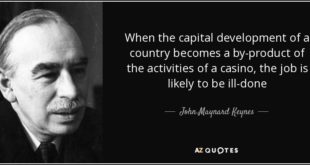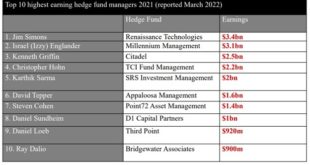from Lars Syll Yours truly’s latest book has made it onto Amazon’s lists of best sellers in economics and econometrics. I am — of course — truly awed, honoured and delighted.
Read More »Ideology maintained the system that produced the inequality
from John Komlos and RWER issue 104 . . . for the first 97 percent of our species’ history, humans did not compete for status by amassing economic and political power and thus such inequality cannot be viewed as socially necessary. Such competition was proscribed because it would be destructive of these societies’ collective well-being. Instead, their rules of the game compelled them to compete in other manners beneficial to the community, such as by being good warriors, good hunters and...
Read More »Keynes and the casino
from Lars Syll According to Keynes, financial crises are a recurring feature of our economy and are linked to its fundamental financial instability: It is of the nature of organised investment markets, under the influence of purchasers largely ignorant of what they are buying and of speculators who are more concerned with forecasting the next shift of market sentiment than with a reasonable estimate of the future yield of capital-assets, that, when disillusion falls upon an...
Read More »Annual league table of top hedge fund managers’ earnings
from http://www.paecon.net/PAEReview/issue104/Fichtner_Morgan104.pdf The Institutional Investor publishes an annual league table of top hedge fund managers earnings. The latest data at time of interview was from March 2022 and reported that “Altogether, the 25 highest-earning hedge fund managers earned a combined $26.64 billion last year, the second-highest amount in the history of the Rich List… Over the past two years, the members of the Rich List’s First Team have made more than $58...
Read More »The myth of the “Free Market”
from Dean Baker The media are really going overboard in telling us the days of the free market are over with Biden’s new economic policies. President Biden has quite explicitly implemented policies intended to reshape the direction of the economy, pushing clean energy and more domestic production of advanced semiconductors and other products. He also has reinvigorated anti-trust policy, which was largely shelved by his predecessors. But the idea that the policies of the last four decades...
Read More »RWER issue no. 104
Please click here to support this journal and the WEA RWER Issue no. 104download whole issue The Dead Parrot of Mainstream EconomicsSteve Keen 2 Why Hedge Funds Matter: An interview with Jan FichtnerJan Fichtner and Jamie Morgan 17 ETF shares as shadow moneyAlexandru-Stefan Goghie 49 The Dollar Centric Financial System and the Conflict in UkraineMarcello Spanò 67 A Note on Teaching Economic InequalityJunaid B. Jahangir 75 Book Review: Muhammad Ali Nasir, Off the Target: The Stagnating...
Read More »long read – The social consequences of inflation in developing countries
from Jayati Ghosh Abstract The title of this article is a riff off a publication of G. C. Harcourt’s 1974 piece, ‘The social consequences of inflation’. He wrote this in a period of the global economy that bears some strong similarities to our own contemporary phase when inflation is suddenly back in the global headlines. There is at least one significant difference: at that time, Harcourt highlighted inflation as the outcome of an excess of total demand in real terms over available...
Read More »The façade of precision in mainstream economics
from Lars Syll [Jevons] is a man of some ability, but he seems to me to have a mania for encumbering questions with useless complications, and with a notation implying the existence of greater precision in the data than the questions admit of. John Stuart Mill Fixation on constructing models — “implying the existence of greater precision in the data than the questions admit of” — showing the certainty of logical entailment — realiter simply collapsing the necessary ontological gap...
Read More »Are western democracies and pluralism in economics in danger?
from Maria Alejandra Madi Regarding Western democracies, Steven Levitsky and Daniel Ziblatt, two Harvard scholars, think that the answer is yes. They base their answer on decades of study and a wide range of historical and modern cases, from 1930s Europe to modern Hungary, Turkey, Venezuela, North and South America. Instead of a revolution or a military takeover, the authors believe that there will be a steady and slow breakdown of long-standing democratic rules and institutions. For...
Read More »New York Times headlines article “Public Tired of ‘Neo-Liberal’ Policies Designed to Make Rich Richer”
from Dean Baker Of course, the New York Times did not headline a piece this way, but that would have been a more accurate headline of an article it ran last weekend discussing a turn away from “neo-liberal” policies. As I pointed out in a quick Twitter thread, that piece misrepresented a set of policies that have the effect of redistributing income upward as “free market” policies. This is wrong in a way that is very convenient for the proponents of these policies. The massive upward...
Read More » Real-World Economics Review
Real-World Economics Review




